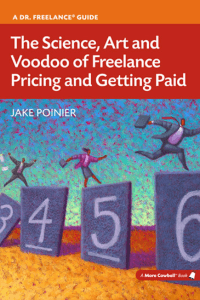 Dr. Freelance: Like you, I prefer to give prospective clients a range estimate. But once they accept it, what number do I use to determine the amount for freelance project deposits? I’ve heard anywhere from 30-50%—I’m feeling comfortable with 35%, personally—but 35% of what? The low end? The mean? Probably *not* the high end.—Rachel
Dr. Freelance: Like you, I prefer to give prospective clients a range estimate. But once they accept it, what number do I use to determine the amount for freelance project deposits? I’ve heard anywhere from 30-50%—I’m feeling comfortable with 35%, personally—but 35% of what? The low end? The mean? Probably *not* the high end.—Rachel
I’ll give you my tl;dr answer first, Rachel: For my business, I usually calculate the deposit on the lower end of the range, since I try to keep the gap within a few hundred dollars. (For example, I’ll present an estimate of $2,000-$2,400, not $1,200-$2,400. If the gap is wider than that, either the client hasn’t given me enough information or I haven’t asked enough questions.) Depending on some of the factors under the subhead below, my most common approach is 33% upfront and 67% at final approval, or a straight $500, although I know plenty of peers who request 50%, which is fine, too. If it’s a long-term project that will take months, the best route may be to do 1/3 each at the beginning, middle, and end. (I also recognize that some freelancers require a full upfront payment. If that works for you, keep on truckin’!)
Ultimately, how you handle it depends on your trust level with the client. The act of asking for and receiving a project deposit isn’t just about the money. It signals a client’s mental commitment and therefore functions as a final part of the sales process, including a point for negotiation. The deal ain’t done till the deposit check clears.
One Size Doesn’t Fit All for Freelance Project Deposits
The deposit game is about understanding the interplay between your own business requirements and how you’re reading the client’s individual situation and behaviors. For the sake of sanity, you want to be consistent about your process—but don’t be so rigid that you hurt yourself financially by driving away a good client or inadvertently taking on a problem client. Some rules of thumb:
- A person who hasn’t hired or worked with freelancers may not be aware that it’s common practice for us to request a deposit. It’s your responsibility as a businessperson to educate them. The benefit to them is that you’re committed to their needs and can immediately start work.
- I don’t do business with anyone who doesn’t want to put down a deposit without a really good reason, because it’s a major no-pay/slow-pay warning sign. There are exceptions, however. For example, it can be difficult for big, bureaucratic companies that aren’t nimble but have a tight deadline. I’m going to assume a Fortune 500 is good for payment in full at the end. That’s a risk that I probably wouldn’t take with a smaller company, startup, or first-time author, however, especially if they mention tight budgets.
- It also makes a difference if someone found me through a trusted referral source vs. blind inquiry from my website. The former has a vested interest in making the person who referred them look good. Important: That’s not to say I won’t ask for a deposit, only that I may be more flexible about terms.
- On a small project—a few hundred dollars—I might ask for a larger percentage as a deposit. If I’m getting the sense that it’s a semi-squirrelly client, I’ll definitely ask for a larger percentage (if I decide to work with them at all).
- Personally, I don’t require a deposit once a client has a proven track record of paying. I’m not recommending that course of action for everyone, simply saying that’s what I do! If it’s a particularly high-dollar or long-running project for a long-term client, I may request a partial payment at the halfway point or elsewhere. My better clients will usually offer before I even ask.
- I will request a deposit from existing clients who have had payment challenges in the past. It provides leverage in case they start to revert to flakiness.
- Above all, I never look at deposits as “well, at least I’ll get paid something” in case a project goes sideways. Thinking of deposits as a kill fee is a weak mindset. I always want to complete a project to the client’s satisfaction and get paid in full.
Final thought: At the beginning of a relationship, you’re setting the tone for what happens in the future. Conversely, your prospective client will be displaying behaviors that aren’t likely to change. Freelance project deposits can serve as a red flag…or the beginning of a mutually respectful and beneficial business partnership.
***
 The Science, Art and Voodoo of Freelance Pricing and Getting Paid offers a more detailed explanation of how to crunch the numbers, formulate persuasive estimates, and give yourself more leverage in negotiations with potential freelance clients.
The Science, Art and Voodoo of Freelance Pricing and Getting Paid offers a more detailed explanation of how to crunch the numbers, formulate persuasive estimates, and give yourself more leverage in negotiations with potential freelance clients.
Already read it and found it beneficial for your freelance business? I always appreciate reviews on Amazon and Goodreads—thank you in advance!